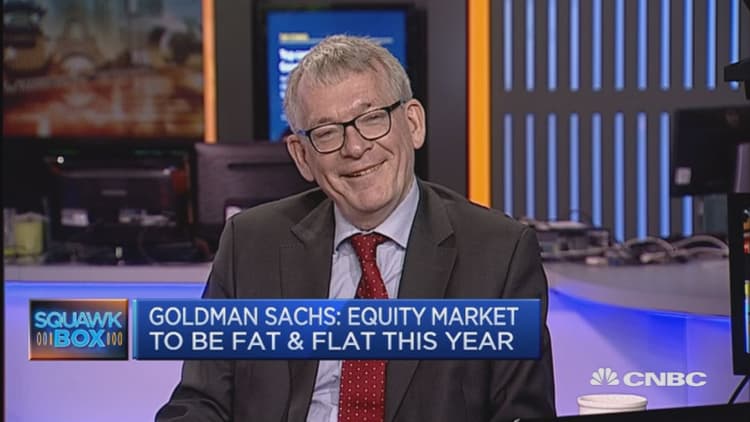
Recent stock market volatility has demonstrated that markets have overpriced the risk of deflation, the chief global equities strategist at Goldman Sachs told CNBC, saying there were good investment opportunities to be had in Europe.
Reflecting on recent market volatility, Goldman's Peter Oppenheimer said there was confusion in the market over which way the global economy was heading with concerns over deflation a major factor for investors – concerns he thought were overdone.
"There's a lot of uncertainty about whether we're really in a deflationary world with secular stagnation or something a little bit more benign. Our own view is that it's more benign and that the market has overpriced deflation," Oppenheimer told CNBC on Wednesday.
"But the uncertainty over which of these two trajectories we're in is causing that volatility."
"But as we've seen in the most recent data from the U.S., you have got core inflation that's still positive and the markets have priced something a lot more negative," he said. Oppenheimer believed there were opportunities in European stocks, however.
"We're starting to see the dispersion of stock returns rising within and across sectors as well and that's an opportunity, it's an environment where alpha prospects (opportunities where a trader can make a return higher than what the market is offering) a risk ratio used to predict returns) are pretty good and hopefully where you can extract a lot of returns from the market index, even if the overall index is not moving that much."
Also speaking to CNBC on Wednesday, David Marsh, managing director and co-founder of advisory group Official Monetary and Financial Institutions Forum agreed that there was "a lot of alpha around in Europe."
"If the euro goes weaker that's a tremendous fillip to these very globalized German or Swedish or French companies that will be getting in their export returns, translating them into euros. I think you can easily be quite bullish on some of the European stocks if euro continues to go down"
'Fat and flat' markets
The comments follow the latest note issued by Peter Oppenheimer and Goldman Sachs in which the strategist noted that the equity market had been "fat and flat" so far this year - that is, a market with a "wide trading range but with relatively low aggregate returns."
"This is simply that in recent years most equity markets have gone up a lot mainly because of valuation expansion - as interest rates have moved towards zero and quantitative easing (QE) came through - so they started with a relatively high valuation. And we think profit growth will be positive (this year) but not that strong and so you get a relatively flat return but lots of trading opportunities," he explained on Wednesday.
Oppenheimer largely attributed market volatility at the start of the year to what he called a "third wave" of the financial crisis affecting emerging markets (the first wave being the US sub-prime crisis and the second the European sovereign crisis) and concerns among investors should monetary easing be introduced in emerging markets.
The market has staged a partial rebound from the sharp falls in January but Goldman sees "much of this as about positioning rather than fundamentals" and that a recovery depended on a number of factors.
"To get a sustained recovery, we think that either the market falls further and becomes truly cheap or it is likely to remain volatile and directionless in the near term until we see a turn in economic fundamentals, the oil price and inflation expectations."
He added that for equities "to move meaningfully higher from here, we think valuations would need to be cheaper first. Without this, the market is likely to remain volatile, but tread water until there is a clear shift in inflation expectations. When either (or both) of these things happen, we expect a sharp rally led by financials (where valuations are overshooting), with staples most at risk."
- By CNBC's Holly Ellyatt, follow her on Twitter @HollyEllyatt.


